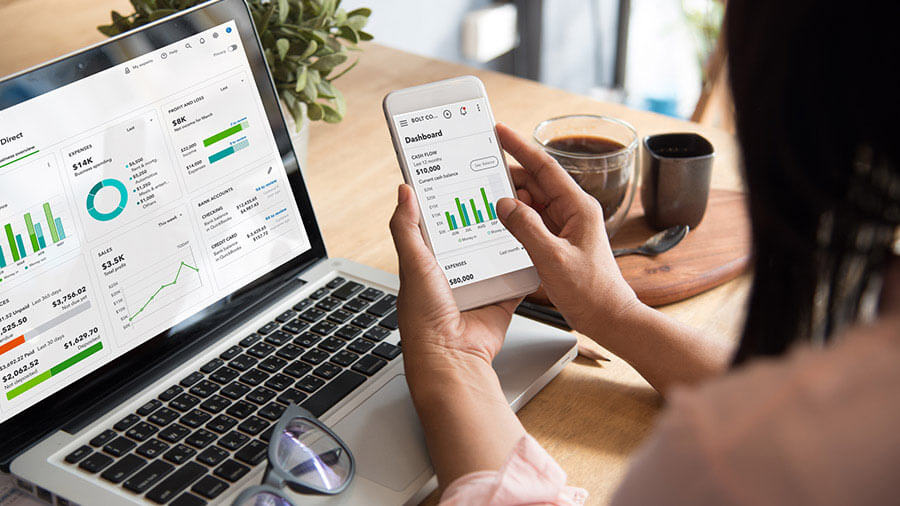Why Cloud Accounting is More Secure Than You Think – And Why It’s Worth the Risk
When you think about managing your business’s finances, the first thing that probably comes to mind is security. The thought of moving your financial data from a desktop system or physical files to the cloud might sound risky. After all, your business’s financial information is one of its most valuable assets.
Who wouldn’t want to protect that with the highest level of security possible? But what if I told you that cloud accounting might actually be one of the safest options available? In fact, it might even be more secure than the traditional methods many businesses still rely on.
Cloud-based accounting software has made significant strides in terms of security, and it’s now one of the most secure ways to manage your finances. From encryption to continuous backups, cloud platforms are designed with security at their core. But what exactly makes cloud accounting more secure than you might think? And why is it worth the risk for businesses to make the switch?
Data Encryption: Your Information is Locked Up Tight
One of the biggest concerns businesses have when it comes to cloud accounting is the security of their financial data. After all, you wouldn’t want sensitive information like employee salaries, invoices, or tax records floating around without proper protection.
The good news is that cloud accounting platforms use encryption to protect your data. Encryption works by converting your information into a code, making it unreadable to anyone who doesn’t have the key to unlock it.
When your data is encrypted, it’s much harder for hackers to access or steal sensitive information. And not only is your data encrypted during transmission (as it’s being sent between your computer and the cloud), but it’s also encrypted when it’s stored in the cloud. This means even if someone were to gain access to your cloud provider’s servers, they wouldn’t be able to make sense of your data without the proper decryption key.
Regular Backups: Never Worry About Losing Your Data Again
One of the major risks of traditional accounting methods is the potential for data loss. Whether it’s due to a hard drive failure, a natural disaster, or even human error, losing your financial data can be disastrous. But with cloud accounting, your data is constantly backed up, which means you’re protected against loss.
Cloud accounting providers usually store your data in multiple, geographically distributed data centres, which means that even if one location goes down due to a power failure or disaster, your information is still safe and accessible from another site. This redundancy makes it far less likely that your data will be lost or compromised.

Access Control: You Decide Who Gets to See What
Another key advantage of cloud accounting is the ability to control who has access to your data. With traditional accounting systems, multiple people may need to access the same information, which increases the risk of errors or breaches.
In contrast, cloud accounting platforms allow you to assign user roles with specific permissions. For example, you might give your accountant full access to financial reports but only allow other employees to view certain sections, like payroll or invoices.
This granular control means you can limit who has access to sensitive data, making it easier to protect your business’s financial information from internal threats. And with cloud accounting, you can also track who has accessed your data and when adding another layer of transparency and accountability.
Automatic Updates and Security Patches: Always Stay One Step Ahead
Security is a constantly evolving field, and cloud accounting platforms are designed to stay up-to-date with the latest threats. One of the biggest benefits of using cloud-based software is that it automatically updates itself, ensuring that you’re always using the most secure version of the software. This is a big advantage over traditional, on-premise software, which often requires manual updates and patches.
Automatic updates mean that your cloud provider is constantly working behind the scenes to improve security and fix any vulnerabilities as soon as they’re discovered. This helps protect your business from cyberattacks and ensures you’re not left behind as new security threats emerge.
Two-Factor Authentication: An Extra Layer of Protection
Many cloud accounting platforms also offer two-factor authentication (2FA), which adds an additional layer of security when logging in. With 2FA, you need to provide two pieces of information before you can access your account: something you know (your password) and something you have (usually a code sent to your phone or email). This makes it much harder for hackers to gain access to your account, even if they manage to steal your password.
Two-factor authentication is one of the most effective ways to protect your business’s financial data, and many cloud accounting platforms offer this as an optional security feature. It’s a simple but powerful tool that can give you peace of mind knowing that your accounts are secure.
6. Data Accessibility: Security with Convenience
One of the primary reasons businesses are hesitant to move to the cloud is the fear that they’ll lose control over their data or make it too easy for anyone to access. However, cloud accounting actually gives you more control and flexibility over your data than traditional methods.
With cloud accounting, you can access your financial data anytime, anywhere – as long as you have an internet connection. This means you can keep an eye on your finances while travelling, access your data from multiple devices, or work remotely without sacrificing security. Additionally, cloud-based platforms often integrate with other business software, which can streamline your operations and improve your workflow.
Cloud Accounting Is Cost-Effective in the Long Run
When considering security, it’s also important to look at the costs involved in traditional accounting systems. Managing on-site software, security measures, and backups can become expensive.
Cloud accounting eliminates the need for hefty upfront costs, hardware, and maintenance. Cloud software is typically offered as a subscription service, which means you only pay for what you use, and it’s all bundled together.
The continuous updates, built-in security features, and automatic backups are included in the service fee, so there are fewer unexpected costs. Over time, this cost-effective solution can actually save you money compared to maintaining a traditional system that requires constant upgrades and dedicated IT support.
Conclusion: The Future of Accounting is Secure in the Cloud
At first, the idea of storing sensitive financial data in the cloud might seem like a gamble. But the truth is that cloud accounting has proven to be one of the most secure and efficient ways to manage your business’s finances. With encryption, automatic backups, access control, and real-time updates, cloud platforms are constantly evolving to offer the best protection possible.
The convenience and security cloud accounting provides make it a game-changer for businesses of all sizes. It’s worth considering if you haven’t already made the switch. So, when you weigh the benefits of security, cost-effectiveness, and flexibility, the risk of moving to cloud accounting seems well worth it. Your business’s financial data might just be safer in the cloud than you thought.








